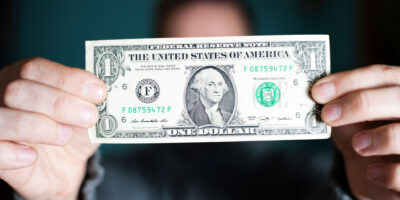The War on Cashless Stores
If you’re a store owner in Philadelphia or New Jersey, and you don’t accept cash from your customers, pretty soon you’ll be breaking the law. Last month Philadelphia became the first U.S. city to ban cashless stores. Other cities are considering the approach. And a few days ago, New Jersey became just the second state to prevent stores from refusing to accept banknotes and coins.
Cashless bans are well-intentioned. The idea is to ensure that consumers can continue to enjoy the financial privacy provided by cash as well as guaranteeing that low-income shoppers — many of whom don’t have access to credit cards — can still make purchases.
However, forcing store owners to deal in cash restricts their ability to design the shopping experience as they see fit and may saddle them with unwanted financial and security costs. There are better options than bans on cashless stores. Rather than imposing banknote acceptance by force, why not work toward improving the product? If cash were better, then store owners and consumers might choose to deal in it of their own accord.
By implementing cashless bans, New Jersey and Philadelphia aren’t choosing an entirely unique approach. Massachusetts banned cashless stores in 1978 with the passage of an amendment that prohibited discrimination against cash users: “No retail establishment offering goods and services for sale shall discriminate against a cash buyer by requiring the use of credit by a buyer in order to purchase such goods and services.”
And in 1984, the nation of Denmark adopted a so-called “cash rule.” With the bank-owned Dankort electronic payments system being rolled out that year, the Danish government wanted to ensure it would be possible for everyone to make a payment, not just those with a card. To this day, Danish stores are obligated to accept banknotes, with a few exceptions. In next-door Sweden, the nation’s central bank — the Riksbank — has recently proposed implementing a Danish-style cash rule.
The reasons for going cashless are understandable. Some stores simply don’t process that many cash payments anymore. It doesn’t make much sense for them to incur the fixed costs of maintaining a system for storing and handling cash. Other stores may be worried about stolen cash and the risk of holdups; with a card-only policy, these worries are alleviated.
At the same time, one can sympathize with the motives for the bans put in place by New Jersey and Philadelphia. New Jersey State Assemblyman Paul Moriarty has privacy concerns, noting that the bill protects people who “don’t want every aspect of their life recorded, stored, and monetized by credit card companies, right down to the purchase of a stick of gum.” William Greenlee, the council member who introduced the bill in Philadelphia, worries about the unbanked. According to the FDIC, there are 8.4 million American households that do not have access to a bank account. “Most of the people who don’t have credit tend to be lower income, minority, immigrants,” says Greenlee. “It just seemed to me, if not intentional, at least a form of discrimination.”
Cash is both an important tool for protecting one’s privacy and an inclusive form of payments. But it isn’t the only instrument to have these properties. As I wrote in a previous article, non-reloadable open-loop prepaid debit cards, otherwise known as gift cards, also allow for anonymous payments wherever MasterCard or Visa is accepted. And because preloaded debit cards do not require identification, anyone can get access to them, even those with poor credit records. So even if a store doesn’t accept cash, consumers with privacy concerns or no bank account still have a means to buy stuff.
Prepaid cards are no panacea, however. Anti-money-laundering regulations have placed a limit on the size of anonymous debit cards, which means that it is difficult to buy cards with a face value in excess of $250. And fees can be high. To activate my $25 Vanilla MasterCard debit card, I recently had to pay $3.95, which amounts to a whopping 15.8 percent fee.
Rather than having governments impose cash on shopkeepers, maybe central banks like the Federal Reserve need to step up their game. Thanks to continual innovation from the likes of Visa and MasterCard, cards have been eating into cash’s share of payments. Any company facing a highly successful competitor would go to great pains to understand why their customers are fleeing. But in a recent debate with Larry White, Ken Rogoff made the point that central banks — which have highly profitable monopolies on cash issuance — commit almost no resources to surveying their users. If central banks knew more about who their customers are and why they like banknotes, they might get better at serving the public.
Central banks might want to consider providing a small reward to banknote owners by way of a banknote lottery. Each week, those in possession of the winning serial numbers would receive a prize of a few hundred bucks. Consumers would find this fun and financially rewarding; the renewed interest in cash would help to support its use in payments. Retailers, ATM providers, and cash-in-transit companies would be able to earn some income on their note inventories, thus defraying storage and handling costs.
A note lottery would help to short-circuit the vicious circle into which cash usage is spiraling. Payments systems like cash or credit cards are kept in place by network effects, or inertia. Cash is widely held by consumers because it is accepted by stores, and in turn it is accepted by stores because it is widely held by consumers. But as consumers use less of the stuff, it becomes more costly for stores to serve the remaining cash-using population, which means that fewer stores will accept it, which means that consumers will use less of the stuff. Bans on cashless stores may be a way to slow down this negative feedback effect. But a banknote lottery might be just as effective — without infringing on the rights of storekeepers to choose how they wish to be paid.
Another option would be to allow the private provision of banknotes. If central banks are shy about promoting and improving their products, commercial bankers would not be. Who knows what kinds of innovations the private sector might bring to the product? A war on cashless stores is a last-ditch move. With a bit of imagination, it’s possible to imagine all sorts of less intrusive alternatives.











